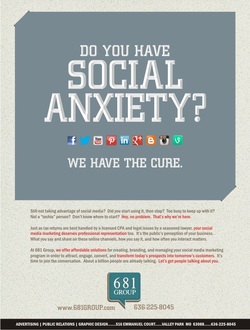Whether you think you know advertising, social media, public relations, and marketing or not, getting your business or product noticed is hard work.
But one thing is for sure: If you don't market your business, no one else will.
Here are some basic strategies you can and should be executing. Best yet, most of them are free. If you get these things down, then you are ready to start advertising.
No. 1: IDENTIFY YOUR AUDIENCE
It may seem like a no-brainer, but many businesses fail to identify just who to talk to. Once you know "who" then you can go about "how" to reach them.
No. 2: REACH OUT TO LOCAL MEDIA
One of your audiences will invariably be the media. You can't pitch all media outlets the same way. Television has different needs from print and radio and vice versa. But before you pitch ask yourself:
Is your product or service the first, best, or brand new?
Is it award-winning or trendsetting?
Does it solve a problem?
Does it provide a unique service?
Is it visual (TV and online mostly, but print also has gotten into video)
If you don't have anything that fits into the above categories, then you probably don't have a news story.
No. 3: SOCIAL MEDIA
Pick one or two of the top social media platforms (think Facebook, Twitter, Instagram, Snapchat, YouTube, or Linkedin) that make sense for your business and master them.
Fact is, you can (and will) spend hours on social media. In order to make the best use of your time, here are some general rules of the road:
The goal is to engage customers. Be a part of the discussion in your industry and it will help you gain an audience or followers.
Don't be afraid to "friend" or "follow" reporters. Your ideas may spark stories for them.
Ask for feedback. Again, engagement is the key. You want them to "like" and "share" or "retweet" what you post.
Video has become dominant on social media. It's getting a ton of traction right now. Think Facebook Live. Instagram. Snapchat. And, by all means, try to get comfortable being in front of the camera.
Once you learn the ropes, start investing and keep investing. If you're not a celebrity, athlete, prom king, or Kardashian, you're organic reach is going to relatively small, so you are going to have to pay to play.
No. 4: FREE DIRECTORY LISTINGS
Be sure to claim your business in online directories such as Google Business, Bing, Yelp, and more. There are also a ton of others.
Claiming your business lets you know and respond when people have something nice (or bad) to say. It will also allow you to dispute negative comments.
And by all means, keep track of all the login names and passwords while registering on these directory sites.
No. 5: YOUR WEBSITE
I'm assuming you already have one if you are reading this, but you need to make sure you are making the most of it. With the constant changes in search algorithms, you want to make sure your content is fresh. One of the best ways to do this is to have a blog. I see a lot of websites that were built a year or two ago and haven't been touched since.
No. 6: BECOME AN EXPERT
Let's face it, if you are running your own company, you are an expert in your business. The same things that make your company newsworthy are the things that make you an expert.
Start a blog and talk about what you know, what you are learning along the way – challenges and successes. You can also post links to articles from other people (make sure to give proper credit) or comment on them.
No. 7: GET INVOLVED IN YOUR COMMUNITY
Look for groups and associations that align with your priorities and beliefs. Volunteerism is a great way to network as well.
No. 8: CONSTANTLY & CONSISTENTLY BRAND YOUR BUSINESS
Chances are your company already has a name and logo. (If you don't, we need to talk immediately) It should be on everything — correctly and consistently formatted. Your name and logo are the image that says who you are and what you do. Make sure it reflects your business and high standards.
H/T - Helen Todd - Bizjournals.com
But one thing is for sure: If you don't market your business, no one else will.
Here are some basic strategies you can and should be executing. Best yet, most of them are free. If you get these things down, then you are ready to start advertising.
No. 1: IDENTIFY YOUR AUDIENCE
It may seem like a no-brainer, but many businesses fail to identify just who to talk to. Once you know "who" then you can go about "how" to reach them.
No. 2: REACH OUT TO LOCAL MEDIA
One of your audiences will invariably be the media. You can't pitch all media outlets the same way. Television has different needs from print and radio and vice versa. But before you pitch ask yourself:
Is your product or service the first, best, or brand new?
Is it award-winning or trendsetting?
Does it solve a problem?
Does it provide a unique service?
Is it visual (TV and online mostly, but print also has gotten into video)
If you don't have anything that fits into the above categories, then you probably don't have a news story.
No. 3: SOCIAL MEDIA
Pick one or two of the top social media platforms (think Facebook, Twitter, Instagram, Snapchat, YouTube, or Linkedin) that make sense for your business and master them.
Fact is, you can (and will) spend hours on social media. In order to make the best use of your time, here are some general rules of the road:
The goal is to engage customers. Be a part of the discussion in your industry and it will help you gain an audience or followers.
Don't be afraid to "friend" or "follow" reporters. Your ideas may spark stories for them.
Ask for feedback. Again, engagement is the key. You want them to "like" and "share" or "retweet" what you post.
Video has become dominant on social media. It's getting a ton of traction right now. Think Facebook Live. Instagram. Snapchat. And, by all means, try to get comfortable being in front of the camera.
Once you learn the ropes, start investing and keep investing. If you're not a celebrity, athlete, prom king, or Kardashian, you're organic reach is going to relatively small, so you are going to have to pay to play.
No. 4: FREE DIRECTORY LISTINGS
Be sure to claim your business in online directories such as Google Business, Bing, Yelp, and more. There are also a ton of others.
Claiming your business lets you know and respond when people have something nice (or bad) to say. It will also allow you to dispute negative comments.
And by all means, keep track of all the login names and passwords while registering on these directory sites.
No. 5: YOUR WEBSITE
I'm assuming you already have one if you are reading this, but you need to make sure you are making the most of it. With the constant changes in search algorithms, you want to make sure your content is fresh. One of the best ways to do this is to have a blog. I see a lot of websites that were built a year or two ago and haven't been touched since.
No. 6: BECOME AN EXPERT
Let's face it, if you are running your own company, you are an expert in your business. The same things that make your company newsworthy are the things that make you an expert.
Start a blog and talk about what you know, what you are learning along the way – challenges and successes. You can also post links to articles from other people (make sure to give proper credit) or comment on them.
No. 7: GET INVOLVED IN YOUR COMMUNITY
Look for groups and associations that align with your priorities and beliefs. Volunteerism is a great way to network as well.
No. 8: CONSTANTLY & CONSISTENTLY BRAND YOUR BUSINESS
Chances are your company already has a name and logo. (If you don't, we need to talk immediately) It should be on everything — correctly and consistently formatted. Your name and logo are the image that says who you are and what you do. Make sure it reflects your business and high standards.
H/T - Helen Todd - Bizjournals.com









 RSS Feed
RSS Feed
